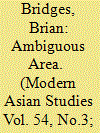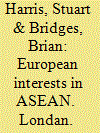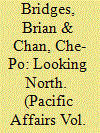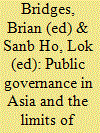|
|
|
Sort Order |
|
|
|
Items / Page
|
|
|
|
|
|
|
| Srl | Item |
| 1 |
ID:
172860


|
|
|
|
|
| Summary/Abstract |
The Mongolian People's Republic (MPR) became the focus of intense competition between the Soviet Union and Japan in the 1930s, when it was more commonly known as Outer Mongolia. The Soviet Union viewed the MPR as an ideological and strategic ally, and was determined to defend that state against the increasingly adventurist actions of the Japanese military based in northern China. Japanese ambitions to solve the so-called ‘Manmo’ (Manchuria-Mongolia) problem led the Soviets to initiate ever-closer links with the MPR, culminating in the 1936 pact of mutual assistance which was intended to constrain Japanese pressure. Using unpublished Japanese materials as well as Russian and Mongolian sources, this article demonstrates how the Soviet leadership increasingly viewed the MPR as strategically crucial to the defence of the Soviet Far East.
|
|
|
|
|
|
|
|
|
|
|
|
|
|
|
|
| 2 |
ID:
070707


|
|
|
|
|
| Publication |
2006.
|
| Summary/Abstract |
The anti-Japanese demonstrations in China in April 2005 and the Japanese reactions have been characterized as a "clash of nationalisms." This article examines in detail the nature of contemporary nationalism in both China and Japan, taking a number of current issues in the bilateral relationship as case studies. It differentiates between state and popular nationalism and between assertive and reactive nationalism. Focusing primarily on popular nationalism, the authors contend that in both China and Japan, contrary to perceptions within each country that the other country is practicing assertive nationalism, in fact reactive nationalism better encapsulates the type of nationalism that is occurring.
|
|
|
|
|
|
|
|
|
|
|
|
|
|
|
|
| 3 |
ID:
169959


|
|
|
|
|
| Summary/Abstract |
A widely-held perception is that the image of North Korea among most Chinese people has changed from that of a socialist comrade and ‘little brother’ to an idiosyncratic, trouble-making neighbor. This research questions the homogeneity of Chinese people’s viewpoints towards North Korea. Concepts of state and popular nationalism are used to examine differences and similarities between the Chinese state and its people in their perceptions and sentiments towards North Korea, mainly focusing on the period of succession from Kim Jong-il to Kim Jong-un. Examining online discussions representing Chinese popular nationalism demonstrated that Chinese netizens’ political viewpoints are diversified along the ideological spectrum of left and right and that only the ‘moderate left’ netizens hold an image of North Korea which is close to that of their political authorities.
|
|
|
|
|
|
|
|
|
|
|
|
|
|
|
|
| 4 |
ID:
032471


|
|
|
|
|
| Publication |
Londan, Routledge & Kegan Paul, 1983.
|
| Description |
89p.
|
| Series |
Chatham House Papers : 19
|
| Standard Number |
0710095589
|
|
|
|
|
|
|
|
|
|
|
|
Copies: C:1/I:0,R:0,Q:0
Circulation
| Accession# | Call# | Current Location | Status | Policy | Location |
| 022871 | 341.2473/HAR 022871 | Main | On Shelf | General | |
|
|
|
|
| 5 |
ID:
083548


|
|
|
|
|
| Publication |
Hampshire, Palgrave Macmillan, 2008.
|
| Description |
xvii, 269p.
|
| Series |
Palgrave studies in European Union politics
|
| Standard Number |
9780230550674
|
|
|
|
|
|
|
|
|
|
|
|
Copies: C:1/I:0,R:0,Q:0
Circulation
| Accession# | Call# | Current Location | Status | Policy | Location |
| 053957 | 303.482405/BAL 053957 | Main | On Shelf | General | |
|
|
|
|
| 6 |
ID:
186806


|
|
|
|
|
| Summary/Abstract |
The article examines the European Union (EU)'s policy toward and interactions with North Korea (DPRK) in order to answer the question, "To what extent, despite prima facie ruptures in the relationship, has the EU been engaged with the DPRK, which is conventionally understood as an unreliable state." Although the EU is seemingly inactive in North Korean affairs, yet it is a powerful institution that can play a significant role in the peacemaking process in Asia including on the Korean peninsula. This article explores, firstly, how the EU's policy toward Asia has evolved historically; secondly, how far such an agenda and principles have been implemented in the North Korean context; and finally, the extent to which previous practices pave the way for the two parties to be included in the process of forming a kind of extended regional governance in future. A common view is that the EU's strategical/political motivation for getting involved in North Korean affairs is negligible due to a lack of economic interests to counterbalance high political risks. This article highlights that, contrary to the common understanding of its soft issue-focused approach to Asia, the EU has been persistently engaged in DPRK affairs, notwithstanding the significant structural barriers. This role underpins the EU's growing intention and potential to enhance interactions under the aegis of comprehensive security (third generation cooperation) covering the economic, social, cultural, and human security-focused aspects of the relationship.
|
|
|
|
|
|
|
|
|
|
|
|
|
|
|
|
| 7 |
ID:
132075


|
|
|
|
|
| Publication |
2014.
|
| Summary/Abstract |
South Korea's diplomatic and security focus has inevitably been on northeast Asia and its difficult relationship with its northern neighbour, but South Korea also has a role to play in the broader Asian Pacific region. This article analyzes South Korea's increasing economic, political, and cultural links with the wider region, in particular with Southeast Asia, and its role in the development of Asian Pacific regionalism. Utilizing the concept of "middle power," it argues that, while clearly South Korea cannot ignore what is happening in its immediate geographical environment of North-east Asia, it does have the economic and political resources to enable it to take advantage of the opportunities for greater interactions with other parts of the Asian Pacific region, particularly Southeast Asia, if the political will exists.
|
|
|
|
|
|
|
|
|
|
|
|
|
|
|
|
| 8 |
ID:
085884


|
|
|
|
|
| Publication |
2009.
|
| Summary/Abstract |
On the 5th January 2007 the first high-express trains began to run between Taiwan's largest two cities, Taipei and Kaohsiung, Modelled on Japan's highly successful shinkansen (bullet trains), these trains were not just a significant export success for Japanese manufactures, but also symbolized th extent to which Taiwan's relationship wuth Japan has been quietly but steadily developing.
|
|
|
|
|
|
|
|
|
|
|
|
|
|
|
|
| 9 |
ID:
095456


|
|
|
|
|
| Publication |
Cheltenham, Edward Elgar, 2010.
|
| Description |
xi, 297p.
|
| Standard Number |
9781848446281, hbk
|
|
|
|
|
|
|
|
|
|
|
|
Copies: C:1/I:0,R:0,Q:0
Circulation
| Accession# | Call# | Current Location | Status | Policy | Location |
| 054931 | 321.8/BRI 054931 | Main | On Shelf | General | |
|
|
|
|
| 10 |
ID:
147586


|
|
|
|
|
| Summary/Abstract |
Throughout the 1920s, distrust and contention marked Anglo–Soviet relations, culminating in the diplomatic break in 1927. In 1929, the incoming Labour government successfully pursued its objective of re-establishing diplomatic relations with Moscow, but the follow-up in terms of ambassadorial appointments was far from routine for either side. This analysis shows that internal pressures complicated decisions about whether to appoint career diplomats or choose political figures. Resisting both claims from enthusiastically hopeful Labour backbenchers and criticisms from the left wing media, the British foreign secretary, Arthur Henderson, chose a Russian-speaking career diplomat. On the Soviet side, the first choice was a controversial politician, but then replaced by a financial expert, albeit one tainted as a defeated political opponent of Josef Stalin. Whilst both ambassadors could be considered “professionals,” neither was able to have a deep impact on the relationship, which remained troubled.
|
|
|
|
|
|
|
|
|
|
|
|
|
|
|
|
|
|
|
|
|